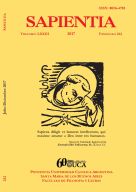Por favor, use este identificador para citar o enlazar este ítem:
https://repositorio.uca.edu.ar/handle/123456789/4773| Título: | La distinción tomista entre filosofía y teología ordenada a la plenitud de la sabiduría cristiana The distinction between philosophy and theology ordered to the plenitude of christian wisdom |
Autor: | Larraguibel Diez, Luis E. | Palabras clave: | FILOSOFIA; TEOLOGIA; Ramírez, Santiago María, O.P., 1891-1967; CRISTIANISMO; Tomás de Aquino, Santo, 1225?-1274; SABIDURIA; CONTEMPLACION | Fecha de publicación: | 2017 | Editorial: | Pontificia Universidad Católica Argentina. Facultad de Filosofía y Letras | Cita: | Larraguibel Diez, L. E. La distinción tomista entre filosofía y teología ordenada a la plenitud de la sabiduría cristiana [en línea]. Sapientia. 2017, 73 (242). Disponible en: https://repositorio.uca.edu.ar/handle/123456789/4773 | Resumen: | Resumen: Siguiendo a Aristóteles, el Aquinate afirma que la contemplación de las realidades divinas constituye el fin último del hombre (In Boet., pr.1). Ahora bien y durante esta vida, este acto debe corresponder analógicamente con la triple división de la sabiduría, es decir, filosófica, teológica o infusa. De allí que sea importante subrayar la distinción real que rige a cada sabiduría —particularmente, filosófica y teológica— para evitar el peligro de confundirlas. Repasaremos la opinión de algunos filósofos (Blondel y Maritain) y teólogos (Günther y Frohschammer) que infringieron esta distinción y contrarrestaremos estos errores según la síntesis del gran comentador tomista Santiago Ramírez: la filosofía no se subalterna, sino se subordina indirectamente a la teología. Finalmente, daremos una especial consideración a la naturaleza psicológica y ontológica de la contemplación infusa, sabiduría superior a las dos anteriores, ya que participa estrechamente de la visión beatífica de los santos en el cielo y depende de la moción especial del Espíritu Santo. Abstract: Following Aristotle, the Aquinas affirms that the contemplation of the divine realities constitutes the ultimate end of man (In Boet., Pr.1) Now and during this life, this act must correspond analogically with the triple division of wisdom, that is, philosophical, theological or infused. Hence, it is important to underline the real distinction that governs each wisdom —particularly, philosophical and theological— to avoid the danger of confusing them. We will review the opinion of some philosophers (Blondel and Maritain) and theologians (Günther and Frohschammer) who infringed this distinction and we will counteract these errors according to the synthesis of the great Thomistic commentator Santiago Ramírez: philosophy is not subaltern, but subordinated indirectly to theology. Finally, we will give special consideration to the psychological and ontological nature of infused contemplation, wisdom superior to the previous two, as it closely participates in the beatific vision of the saints in heaven and depends on the special motion of the Holy Spirit. |
URI: | https://repositorio.uca.edu.ar/handle/123456789/4773 | ISSN: | 0036-4703 | Disciplina: | FILOSOFIA | Derechos: | Acceso Abierto | Fuente: | Sapientia, Vol. LXXIII, n° 242, 2017 |
| Aparece en las colecciones: | SAP - 2017 Vol LXXIII nro. 242 |
Ficheros en este ítem:
| Fichero | Descripción | Tamaño | Formato | |
|---|---|---|---|---|
| distincion-tomista-filosofia-teologia.pdf | 225,86 kB | Adobe PDF |  Visualizar/Abrir |
Visualizaciones de página(s)
162
comprobado en 30-abr-2024
Descarga(s)
293
comprobado en 30-abr-2024
Google ScholarTM
Ver en Google Scholar
Este ítem está sujeto a una Licencia Creative Commons

